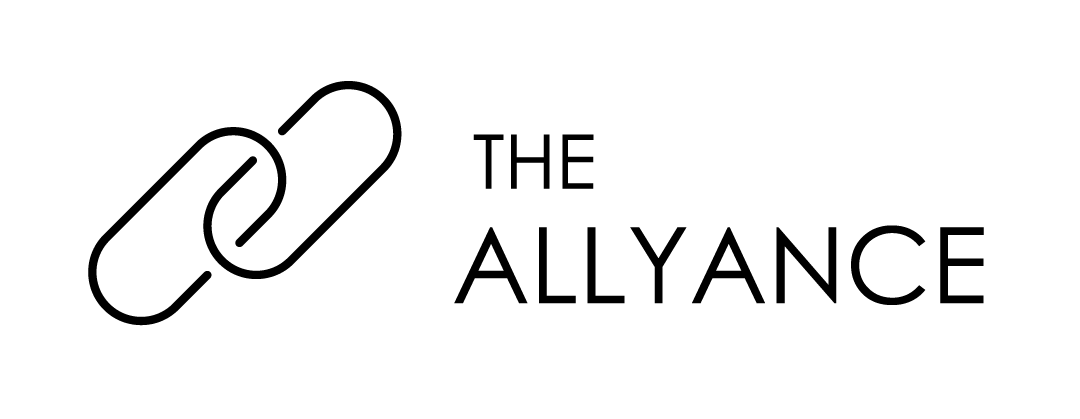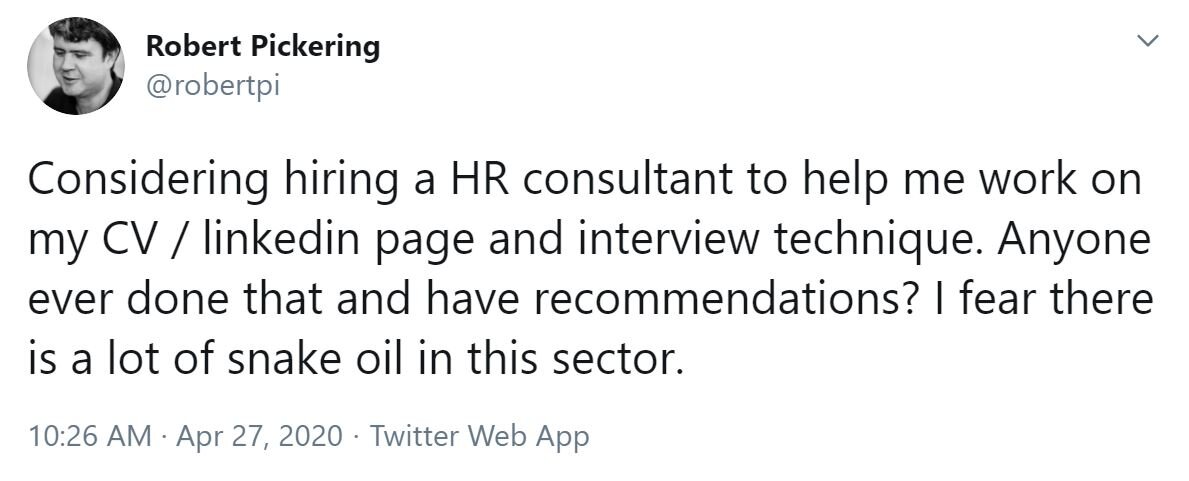Coach Me If You Can - Robert Pickering
💖 The purpose of The Allyance is to help both companies and candidates: companies wanting to reach excellence in hiring and candidates wanting to find the perfect companies.
Today, we are sharing the story behind the coaching sessions between Caroline and Robert Pickering. Indeed, they worked together for several weeks before the 20+-experienced-expert landed a job at Sqreen in order to develop a .NET agent from scratch.
———
🔗 COACH ME IF YOU CAN N°1 - ROBERT PICKERING
Let’s meet Robert and understand how he worked with the Allyance and Caroline.
Who are you? Tell us everything!
💻 I'm a software engineer who's mainly worked on the .NET platform, but I've also worked with a few other platforms too. I have an interest in functional programming and applying it to real world problems. Functional programming got me involved with the F# community and I wrote the first book published about F#. I'm British by birth, but I've lived in the Paris area for the last fifteen years. At the end of 2015, I acquired the French nationality.
What’s your professional background?
🔴 My previous role was at a French startup called RFQ-hub. I was employee number five and stayed there for around eight years. First, I worked as a software engineer, then after three years the company was acquired and my boss (the company co-founder) left. I was chosen to lead the software team of eleven developers. Although I'd led small teams as a consultant, this was my first full time management role.
The company gave me a lot of freedom to run my team as I wanted. I enjoyed leading a team of experienced, knowledgeable software developers. In 2019, a new acquisition happened. Things didn't change over night but the new parent company was very aggressive on costs and it was clear they had little interest in keeping the Paris office open.
At the time, I started looking for a new job thinking it would be straight forward, as I never had any problems in the past. People have always been complimentary about my interview skills. My colleagues knew me for my ability to remain cool under pressure. I'd also been told good technical leaders were rare and in high demand.
How was it to look for a job on your own?
🟠 But weeks of looking for a job turned into months… I noticed that I was not picking up as many interviews as I expected. I also noticed that headhunters based in agencies had little interest in my profile: they rarely responded to my messages and when I did speak to them they seemed disinterested in our conversation.
When I did get interviews, although I quite often got far in the process - through many hours of interviews and often time consuming take home exercises. Yet, the answer was inevitably no.
Feedback was generally vague, things like “you're strong technically but not dynamic enough for our team” or “you're not detail oriented enough for our culture”. It was hard hearing that, especially as I strongly believed I could do many of the jobs I was turned down for.
I decided to reach out of help when a very promising lead didn't work out. For this role I completed a long technical take home test, that I felt I put a lot of effort into, and a lengthy series of interviews. However, the answer was still no, and I learned of my rejection from an answerphone message.
📸 Caroline Chavier & Robert Pickering meeting IRL in September, 4 months after they first talked!
How did you hear about The Allyance?
🟡 I knew I needed help but I wasn't quite sure where to turn. There are many firms offering consulting services on polishing your CV and offering advice about interviews. I felt a generic service wouldn't be able to help. I needed someone specialized in technical recruitment and that didn't seem to exist. So, I took to Twitter to ask for advice and that's how I found my way to Caroline and The Allyance.
Why do you think working with The Allyance was the right fit for you?
🟢 It may seem strange that I (a straight white male) would hire an agency specialized in diversity, but when I spoke to Caroline, I immediately knew I found someone that could help me. Before talking about diversity, it seems fair to acknowledge that although I've never actively sought to use my position as a straight white male to advance my career over the years, it has probably helped my career a good deal.
I believe that at least some of the rejection I experienced was due to ageism. It's hard to talk about ageism objectively, since as you age, your career progresses you will naturally take more senior roles. This will mean there are fewer equivalent roles available so there will be more competition for them. If you have been successful in your career, as I believe I have been, then potentially there will be few firms willing to pay the kind of salary you're asking for, and these firms will be exacting in their hiring decisions.
So there probably were many times when I was turned down for legitimate reasons. I acknowledge that this is speculation on my part but many of the firms I interviewed at were run by people younger than me and I believe there were a couple of hiring decisions that went against me, simply because the companies founders didn't want to hire someone older than them.
What are the key things you learnt during the coaching sessions?
🔵 I think Caroline would agree that my CV and interview skills were reasonably good, but when it comes to landing a senior role job at a top firm "reasonably good" is not good enough. We spent a good deal of time role-playing interviews to perfect my responses. Often, I would handle difficult questions well but my natural modesty led me to leave out important details when given easy questions or the opportunity to talk about myself. Caroline helped me correct this.
There were other ways Caroline helped me too. When looking for a job, having a network is very important. Caroline has an excellent network and was happy to use her contacts to help me.
I found being rejected from jobs hard. Caroline helped me maintain a positive attitude, this was important for interviews, as people are looking out for non-verbal clues about your attitude, but I also thought it really helped me through a difficult period in my life.
What were the difficulties you had to face when looking for a job? Maybe something purely related to the French job market?
🟣 Another factor that I believe hindered me is that although I now have French nationality, I'm not "franco-français". In some ways, it seems strange writing this, as earlier in my career being English seemed to benefit me, helped me stand out from the crowd. Again, this is speculation on my part, but there does seem to be a sort of glass ceiling effect, where people are happy to have an English person as an individual contributor but would prefer someone "franco-français" when it comes to management roles.
One reason I thought this is, I noticed many adverts for senior roles which were looking for candidates that had attended a prestigious "grande école". Many people may think it's acceptable to make good academic qualifications part of a job criteria, but doing so will automatically reduce the diversity of people you recruit for the role, especially when you're very specific in your criteria.
I have a bachelor's degree from the University of Manchester - which I considered to be a good academic qualification - but I doubt a recruiter would consider this the same as a prestigious grande école. I enjoyed my degree and believe the work done in academic institutions is important, but I do not believe it's necessary to hold a degree to work as a software developer or engineering manager. I believe emphasis on academic qualifications in job criteria, especially ones from the "right places", will narrow diversity.
Perhaps all the jobs I was turned down for were purely based on merit, but the experience of being repeatedly turned down for jobs gave me a renewed sympathy for those who are actively discriminated against. Whether I was being turned down on merit or not, the only real solution is to ensure that your CV and interview skills are top-notch. This is where The Allyance helped.
What made the coaching sessions with Caroline Chavier unique according to you?
🟤 The experience worked well. Caroline introduced me to my current employers, Sqreen, and gave me the tools to ensure the interview process went smoothly. I am happy that she helped me find not just a job, but a job that I really want to do, at a firm that is growing and has very good prospects.
Is there any special you would like to share with us?
⚫️ The difficulties I faced while looking for a job have given me new insights into diversity in the software industry. People often complain about the scarcity of good candidates, it's something I've done myself, but I now think this is because we're all looking in the same places for those candidates. Typically, firms will decide they're too busy to train people, and they don't want to pay over the odds, so they'll focus their research on young candidates with a couple of years' experience - the rational being these people are experienced enough to be productive, but not yet too expensive.
This is only one aspect of the diversity issue, but I'd really like to see the software industry open up to taking on people, from all walks of life, with no formal education or previous experience in software development and work on training them on the job. It seems strange to me that at 42 years old, with probably at least 20 years of career ahead of me, that I'm amongst the oldest in my current firm. To tackle diversity fully, I think that the software industry really needs to address this!
Would you recommend The Allyance to other engineers looking for a job?
⚪️ Yes, without any doubt!
———
A few words from Caroline, The Allyance CEO:
“I’ve always had a soft spot for British people because their accent is gracious and elegant. Apart from that, I quickly understood how technical Robert was. Passionate engineers are my favorite people because they always teach you something new! Being an introvert, Robert needed me to better prepare his interviews and optimize his chances to get offers. I loved witnessing Robert’s progress throughout time. Bonus : we both are into photography and art… When I saw he painted, I was amazed and even more enthusiastic.” ⤵️
✔️ Want more?
➡️ If you are interested in knowing more about The Allyance Coaching Offer and the prices, feel free to read this complete piece on the matter! You can also get in touch with The Allyance / Caroline Chavier and book a free conversation here, at the bottom of the page: https://www.theallyance.one/
———
✒️ Caroline Chavier is The Allyance CEO. Highly involved in promoting diversity in engineering teams, Caroline is the co-founder of the Paris Women in Machine Learning & Data Science meet-up. In 2019, she was be an Inclusion & Diversity co-chairwoman at the RecSys Conference in Copenhagen. Caroline has always been passionate about encouraging women to network, speak at conferences and present their work to peers. She is also a passionate tech recruiter, always ready to tweet!








